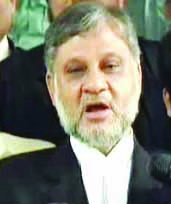
Special Correspondent :
Bangladesh Jamaat-e-Islami faces both split and desertion for failure to read the heart and soul of the people and for hesitation to seek apology for its role during the War for Independence of Bangladesh.
The party has been facing tough situation after nine of its top leaders were sentenced to death for their role in 1971 following conviction by a special court set up by the government in 2010, and cancellation of the party’s registration with the Election Commission.
Jamaat, the largest religious-based political party in Bangladesh, on Saturday expelled its Majlish-e-Surah (central working committee) member Majibur Rahman Manju. But it did not spell out the reason thereof and even did not issue press statement in this regard.
Manju’s expulsion comes at the heel of the resignation of Jamaat’s Assistant Secretary General Barrister Abdur Razzaq, who took the decision citing the party’s failure to apologise for its role in the Liberation War and failure bring reforms to its charter, further deepening the party’s crisis. Pressure was mounting on Jamaat’s current leadership to accomplish with the strategic needs to change its manifesto in view of death of top leaders and cancellation of registration with the Election Commission. But they have failed to reform, causing split inside the party, insiders said.
They said, even the demand for a reshuffle in party’s leadership is getting louder as it has failed to lead the party to a better future.
Top Jamaat leaders, however, could not be reached for comments despite several attempts on their cell phones.
“The resignation of Barrister Razzak is a major setback for the Bangladesh Jamaat-e-Islami. The party may face split following his resignation and it thereby threaten the party’s existence,” Dr Dilara Chowdhury, Professor of Political Science at Jahangirnagar University told The New Nation yesterday.
She said, debate remains in Bangladesh Jamaat-e-Islami regarding apology for its role during the War for Independence of Bangladesh. But majority were against seeking apology. The issue is raised again following the resignation by Barrister Razzak.
“He may form a new party taking advantage of tremendous pressures on the party from all quarters and upholding ideology of Islam. If it happens, Bangladesh Jamaat-e-Islami will not exists anymore in the country’s politics,” apprehends Dr Dilara Chowdhury, adding, “But we have to wait for future manifestation of Bangladesh polity.”
Jamaat, a key ally of the BNP, has been somewhat inactive in mainstream politics after the High Court cancelled its registration with the Election Commission in 2013, barring it from contesting national polls.
Candidates of the party participated in the December 30 election under the banner of the Jatiya Oikyafront (JOF).
“Jamaat remains on the wrong track of politics, facing existence crisis for its past mistakes. Time has arrived for reconciliation. For moral and strategic reasons, the party should offer apology for the atrocities in 1971,” Dr. Zafrullah Chowdhury, a leader of JOF, said this in a talk show at a private TV channel on Saturday.
“He was (Barrister Razzak) the chief defence counsel for the party leaders charged with commission of war crimes at the International Crimes Tribunal. The Jamaat leaders were convicted of charges brought against them and awarded death sentence or jail for life. Barrister Razzaq maintained link with a international lobby to plead for the convicted Jamaat leavers for freedom,” Barrister Tureen Afroz, Prosecutor of the International Crimes Tribunal, told The New Nation on Saturday.
Jamaat had allegedly paid $25 million to an American lobby firm to carry out a smear campaign to make the war crimes trial controversial, former law minister Shafique Ahmed told parliament on April 28, 2013.
Jamaat opposed the war of Independence and branded it as a conspiracy by a neighboring country. During the nine-month war, Jamaat collaborated with the Pakistani militias in all kinds of operations.
“In my opinion, his stand over 71 apology may be a political stunt. He, however, admitted his party’s role in the Liberation War by taking the stand,” she added.
Barrister Tureen Afroz said that Jaamat leaders committed war crimes during the Liberation War. Barrister Razzak was one of them. He should also be tried. Confession of a crime does not mean that accused will be exempted from punishment.
She also said that Jamaat-e-Islami should be banned in Bangladesh and tried as a political party for its involvement in crimes against humanity during the country’s Liberation War in 1971.
Jaamat was banned in 1959, 1964 and 1972 by executive orders. But the party regained identity taking advantage of changed political situation.
“A case is pending with the court as to whether the party is lawful. Besides, amendments of relevant laws are necessary to try Jammat as a party,” she added.

